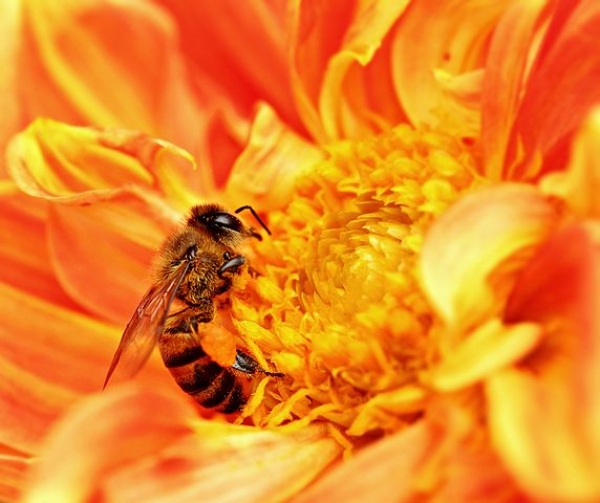

African honey bee. Photo by Sajjad Fazel from Wikipedia (CC BY-SA 3.0).
14 September 2015
South Africa’s R7 billion a year fruit industry is threatened with potentially massive job and financial losses. It is a looming crisis that calls for urgent and comprehensive action at government level before the threat, still restricted to the Western Cape, spreads. It is also something that highlights the integrated nature of the modern economy.
The threat comes in the form of American Foulbrood (AFB) disease that is killing members of that essential army of unpaid workers: bees. Honey bees to be exact. They are critical for the pollination of the orchards that produce the apples, pears, citrus and other fruits that make up a major export market.
Honey bees are the most important commercial pollinators in the world. And, to understand how important this is, just consider that 70% of the main crops used for human consumption depend on pollination. Without pollination, there is no food — and people not only have no work, they starve.
In regions such as the Western Cape, fruit is a major industry that employs thousands of human workers in orchards, packing houses and other related industries. Their livelihoods are the first in line, but there would be considerable further knock-on effects, should AFB spread more widely, even if only in the Western Cape.
Yet not only is there inadequate monitoring of unregistered — and therefore, illegal — beekeepers, the official stance is that antibiotics can deal with the problem. However, the use of antibiotics has failed in other countries. As the Australian bee associations note: “Their use merely masks the problem.”
The danger of an even more rapid spread of the disease has been heightened as the annual South African pollination season gets underway, with hives being imported into various fruit growing areas. Riaan van Zyl, of the department of agriculture, notes that the first sign of AFB in South African shores was in 2008.
This year, the South African Bee Industry Organisation estimates that perhaps a third of the honey bees in the Western Cape are now infected. “It just kept spreading, and now it is a crisis,” says leading beekeeper, Brendan Ashley-Cooper.
He points out that although it is a legal requirement to be registered, only 400 of more than 1,000 beekeepers in the province are compliant. The fear now is that AFB could quickly spread northwards — and into the rest of the continent.
As a result, several registered beekeepers are looking to the European Union (EU) — a major buyer of South African fruit — to play a part in helping to deal with the disease. “If EU fruit importers made it a condition that they would only import fruit from farms that had used registered and properly inspected hives for pollination that would help,” says Ashley-Cooper.
But much more concerted, and official, action is needed if the AFB outbreak is to be contained, if not eradicated. In the Australian state of New South Wales, for example, AFB is a notifiable disease.
The EU has also taken stringent measures and has managed to get the infection under control. Like the Australians, the EU was only able to achieve this by strict monitoring and the destruction of diseased hives.
Infected hives are burned in pits and the ashes buried under at least 30cm of earth. “The same applies to old hives or boxes,” says Erika Degani, a researcher and environmental science doctoral candidate at Britain’s Reading University.
She points out that Britain’s Food & Environment Research Agency (Fera) warns that the spores that carry the disease are resistant to detergents and to extremes of heat and cold. They can also survive for more than 40 years unless destroyed.
This pinpoints the major problem in South Africa: unregistered beekeepers, unaware that their hives may be infected with what has been called “AIDS for bees” continue to operate without oversight. And although honey from infected hives is not harmful to humans, it can contain the spores that spread the disease to other bees.
According to the Fera: “If the infection is spotted at an early stage and action is taken to tackle it, no further or only limited spread should occur.” But this requires rigorous supervision and speedy action, both of which are missing here.
Hopefully the warnings of the beekeeper associations will be heeded, and unlike the crisis talks about power, mining and steel, action will be taken before reaching the brink of serious damage.
Views expressed are not necessarily GroundUp’s.